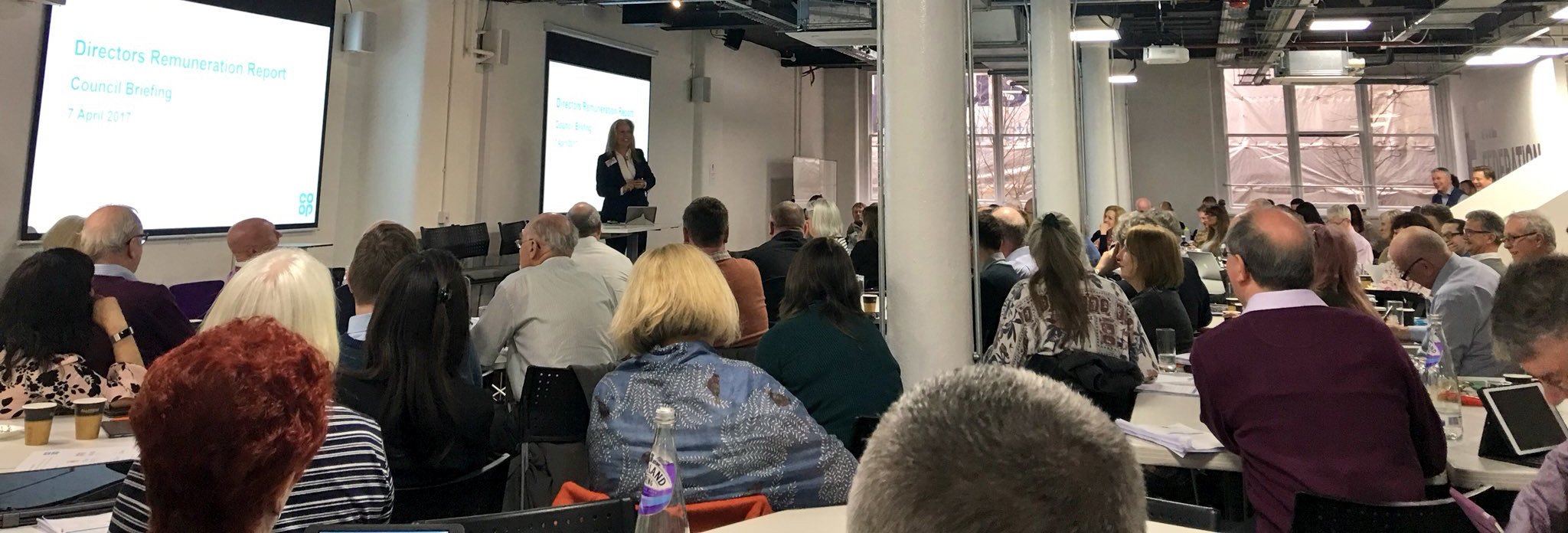The National Members’ Council of the Co-op Group is a unique body among UK co-ops. It is a key element of the Group’s new governance structure and processes, now bedded in, which together ensure that democratic member control remains strong.
After it was formed, the council’s elected members, led by its president Nick Crofts, began to consider the best way it could collectively effectively ‘hold the board to account’ and act as ‘the guardian of the ICA values and principles’.
These responsibilities are set out in the rules – but without any guidance as to how this should be done. A unique solution was needed.
The objective was to create an effective framework which would prioritise those issues of fundamental concern to members.
Related: Ed Mayo looks at co-op values in the modern world
Throughout 2016, working very closely with Co-operatives UK – whose expertise was instrumental – four clear themes were identified as the lenses through which the performance indicators would be determined.
These are:
- Member Value
- Member Voice
- Ethical and Sustainable Leadership
- Co-operative Leadership.
As there are four of them, we pictured them as quadrants – and therefore called it ‘the Co-op Compass’.
All co-operative values and principles were taken into account so the golden thread running through all of the four themes and their KPIs is co-operative difference.
Member Value
It’s vital that any co-op remains commercially strong, particularly when facing a very competitive and testing economic environment. The Member Value theme looks at the value for members financially and also socially to ensure the society is meeting members’ needs. Reviewing the balance sheet and underlying profit is the core catalyst for further discussion with the board. We also monitor the member benefit derived from the 5+1 reward and member experience.

Member Voice
The council has a responsibility to represent and promote the interests of members; it is tasked with being the voice for the various constituencies (geographically and also independent society constituencies). We’re working hard on being more visible and active on social media after council meetings about what has been going on.
Member voice also reflects what the society as a whole is doing to involve our membership in democracy and participation more generally. The Compass reports on voting statistics as well as engagement in the allocation of local community funds. The Compass includes a brand tracker so that the council can reflect and challenge on co-op perception among its members and shoppers.
We also review the number of active trading members, which has increased from 4 million on 31 December 2016 to 4.6 million as of 6 January 2018.
Ethical and Sustainable leadership
The council has adopted KPIs under this theme to open discussion between the council and board on the Group’s ambition on ethical and sustainability targets. The council has a role to act as the guardian of co-operative values and principles. Through the Co-op Way Policy Committee, council members were involved in the consideration of nine policy position statements, including an overarching statement setting out our society’s business ethics and behaviours. Having understood the ambition, the council will review through the Co-op Compass how these ethical policies are embedded.
The council also has a role to review and comment on the society’s sustainability plan. This area of the Co-op Compass will be developed to reflect the Group’s ambition.
Co-operative Leadership
The council is a champion of Principle 6 and is keen for the society to play an active role in the national and international co-operative conversation. The Co-op Compass currently monitors our colleague engagement and also the value of trade with other co-operatives. Further KPIs are to be developed within this theme but success will be a broad recognition of the society’s participation and connection in the co-operative movement, whether through campaigning, trading, or other means of support.
The Compass identified some measurements for those aspects of performance and governance which are at the heart of co-operation. They have allowed the council to prioritise those areas which are key to members. It’s been heartening that the ideas that emerged from the Compass have quickly resonated with a variety of audiences. The Compass is simple to understand, but at the same time operates on many levels, providing focus and flexibility in how it can be applied. It has created a common language to link co-operative difference and Values and Principles with business strategy and performance – and distinguish the co-op difference.
The development of the Compass drew on learning from many co-ops. In this spirit of shared learning, with agreement, the core concept and design (excluding the specific KPI’s) were shared with Co-operatives UK’s Co-operative Performance Committee (CPC) and Governance Forum, linking to other work being developed. Co-operatives UK’s recently published Narrative Reporting: A Framework and guidance for co-operatives developed by the CPC drew on the Compass’s work as part of its own review of best practice.
The council recognises that after successful rebranding, the re-launch of the member proposition, and major re-investment, the forward plan under the banner of ‘Stronger Co-op Stronger Communities’ will be our ambition in the years ahead. Great progress has been made and the council is so pleased we’re on the front foot again on campaigning.

